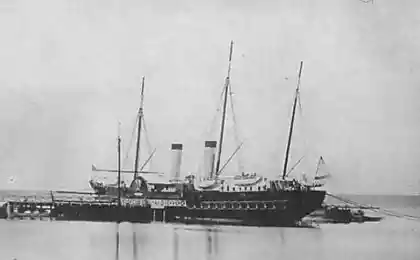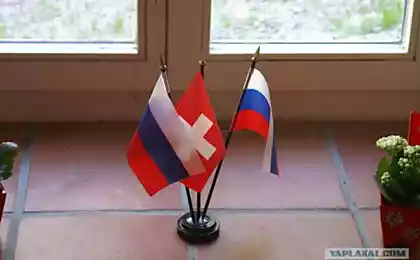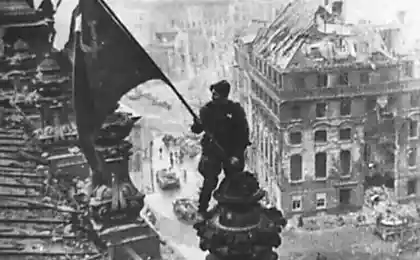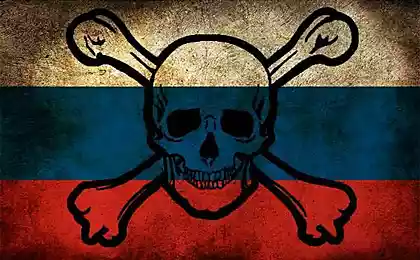641
Royal fun: little-known facts from life of Russian rulers of the XIX century
Seventeen million eight hundred seventy three thousand seven hundred ninety four
The last Russian Emperor Nicholas II (1868-1918) and the Greek Prince Nicholas (1872-1938)
Photo: State archive of the Russian Federation, CA. 1899-1900.
Alexander II (1818-1881) went for the bear with a spear and hated Moscow. Nicholas I (1825-1855) was the only non-Russian Emperor. Alexander III (1881-1894), was not averse to "materkom", but the first of the kings began to refer to subordinates. And Nicholas II (1868-1918), recorded and carefully sketched brand all the jewelry he ever gave. Of all the Emperors did not smoke only Nicholas I. Accordingly, the people working with him didn't, either. And those who worked with those who worked, didn't, either. Didn't smoke and those who worked with those who worked with those who worked. And so on. But because the smokers were treated very poorly all the time of his reign. It was forbidden to smoke even in the streets and squares. The remaining emperors were Smoking. Interestingly, the Empress Catherine and Elizabeth loved snuff. They were both righties, but the tobacco of snuff-taking with the left hand always is tobacco yellowing on the hand skin, and because the left hand yellow and the smell of tobacco, and the right for kissing.
This snuffbox from the erotic collection of Nicholas I:
Incidentally, he is very happy in marriage, as a hobby began to collect erotic collection. This is not surprising. Each of our subsequent the Emperor continued to collect this collection. Both Alexander II and Alexander III, and Nicholas II.
His first bear, a passionate hunter, Alexander II, killed at age 19. And not with a gun, and a spear. He threw his hat on the bear and forth. In the collection of the Gatchina Arsenal remained spears, with whom Alexander went for the bear.
Surprise diary entries about hunting Nicholas II. I have the feeling that he had some kind of complex that is disrupted in the hunt. Here are a few of the records.
19 July 1895: "the duck Hunting was good — just killed 360 pieces".
11 Jan 1904: "the duck Hunting was very successful — total killed 879 pieces."
Buchanan recalled that on one of the hunts Nicholas II was murdered in 1400 pheasants.
In 1900, in Belovezhskaya Pushcha, Nikolai killed 41 bison. As to Belovezhskaya Pushcha, he went hunting every year. Interestingly, the German Emperor Wilhelm II strongly suggests Alexander III to hunt in the Bialowieza forest, but Alexander never took never Wilhelm with him. Alexander had a strong dislike for William.
At pictures of Nicholas II after one of their hunting deer. There is also not so simple. can't shoot does and those who have less than 10 shoots in the horns.
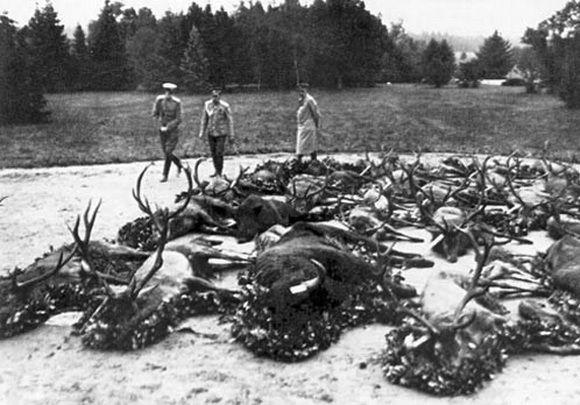
When at the beginning of the First world war in Russia began to Intern Germans who were in the Russian service of the Ministry of the Imperial court, it took all but two of them. One of these two lucky winners were huntsman Nicholas and the Royal huntsman Vladimir R. Diez.
Alexander III has always emphasized his Russianness. To all of "you", he did not disdain and Russian materkom to accelerate their subordinates or to Express your feelings in Russian. In dealing with subordinates he did not have posture — it was very simple, as simple Russian people. Then this beard of his. And the very he loved to be Russian. Although illusions he entertained on this account. His mother, grandmother and great-grandmother was a German Princess. They say that when he read the "Notes" Catherine II and from them learned that the father of his great-grandfather, Paul I, Peter III, and ordinary Russian nobleman, he got excited. Peter the Third was a Holstein-Gottorp Prince, a Russian nobleman still, Russian is heavily increased the share of his, Alexander, Russian blood. Hence the joy.
Alexander I turned to a subordinate, but that was due to the fact that at the court, mostly talking in French, when switched to Russian, then, invariably, passed on "you". Nicholas I told everyone "you". Also with subordinates addressed Alexander II and his brothers. Slave is very afraid, when Alexander Abraxas to their "you" is meant formal tone and the beginning of separation and thunderstorms. The first king who began to talk to subordinates "you" was Alexander III.
— What?? I? Single breasted? What do you mean? Don't know what are single now, nobody is fighting? A disgrace! War at the doorstep, and we are not ready! No, we are not ready for war! ©
New, 1845-yy, the Year Nicholas made his 22-year-old daughter, Grand Duchess Olga Nikolaevna, a Royal gift — she became chief of the 3rd Elisavetgrad hussar regiment. The bomb was so in form, which now had to wear on such occasions Olga. The fact is, like any woman, Olga wanted to be beautiful, and the father wanted to have by the Charter. Olga did not want embroidered embroidery chakirov, didn't want the sword, didn't want pants and wanted a skirt. The conflict was serious. Women are very flexible. They can forgive, forget, sacrifice and, in General, anything, but they can't wear the clothes that they do not like. Olga didn't like the saber — understandable desire 22-year-old girl. The compromise was the exchange: Nikolay agreed to the skirt. Olga was so happy that he agreed to a sword.
Alexander II is rapidly losing its reputation because of this, his second marriage to Catherine Dolgoruky. They were married in a time when it hasn't been forty days since the death of his first wife. And she was no match for him, and stupid, and on calculation on her part, and much more. Family, society, the closest — all of it-began to turn away. Were considered hot in the minds of the most radical options. Why did He marry her??? It turns out he promised her to marry her before the icon.
Two of his younger son, the Grand Dukes Nicholas and Mikhail was sent by his father, Nicholas I in the Crimean war to the front. Because they were sent to the front for the show, and to encourage the soldiers, and then there was a very real — whistling bullets and exploding shells. The guys really fought. Shoulder to shoulder with adult men. Nicholas at that time was 23, Michael 21.
Alexander II hated Moscow. Despite the fact that he was born in it — in the Chudov monastery — he never loved her and couldn't stand. Tried to leave quickly and return less often. I'm trying to present itself on its place in this sense. Not to hate (:-)), and to portability his hometown, the city where I was born is Saint Petersburg. Is not very good and it is not clear how it can be.
Alexander III just after he was born in St. Petersburg. But also said that he hates his hometown — Peter. The happiest time of the year for him was the Passover, when they left to Moscow. Moscow, he was very fond. With pleasure went there and didn't want to go back. He and Peter then lived — he and his family lived in Gatchina. But this is more due to the fact that in St. Petersburg he could easily kill the terrorists, as his father, and in a small Gatchina it was impossible to do, but of Peter he left as soon as walked away from his dying father.
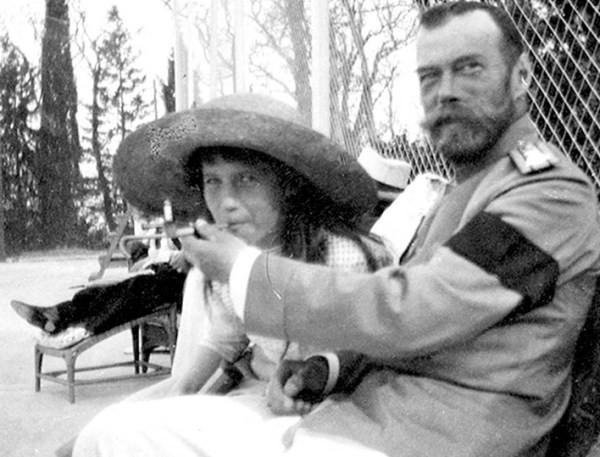
The children of kings in a large number of learned foreign languages. With their relatives, monarchs and princely houses of Europe they were speaking without interpreters. Plus his wife's parents, the mother with the father, which is also preferably in Danish, as Alexander III. But because teaching children foreign languages was very intense. At the request of the Empress Maria Feodorovna in 1856, the Chancellor and Minister of foreign Affairs Gorchakov is preparing a Memorandum on the education of the Grand Dukes. Regarding foreign languages, Gorchakov believed that the Emperor's children is to teach Russian, then French and German languages. Gorchakov stressed that to teach children English, it is not necessary — it still says none in Europe. Now would it! We, the francophils, would be glad :-)
First in Russian, spoke at the court of Nicholas I. Alexander II returned to the French, but even with him his son, the future Alexander III, but while the Grand Duke Alexander Alexandrovich, spoke Russian. Alexander III strongly emphasized his Russianness. He even hated the Grand Duchess Catherine Mikhailovna due to the fact that she spoke very bad Russian, with a horrible accent — the wives of the Great Princes, mostly German Princess, had already in our age to teach the Russian, but because someone has learned it well, and who, as Catherine M., bad. The king is very loved and her children were called "poodle".
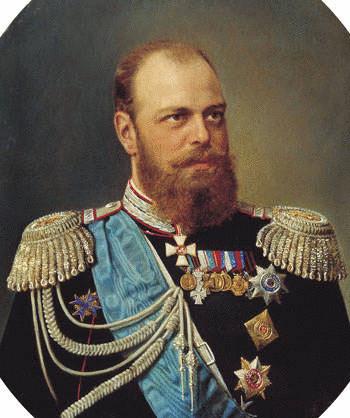
This Alexander III. He's on almost all the pictures with a big beard. His father, Alexander II, long before the Turkish war, was forbidden by decree to wear a beard — he did not love them. And no one wore. View portraits of the nobles and officials of that time — none have beards. Moustache, sideburns, but chin naked. But the Russo-Turkish war and during the war the King allows those wishing to go who wants a beard. And all ponatykano. Including the future Alexander III. However, immediately after the war, Alexander II again prohibits the wearing of a beard is to "freshen up," writes Alexander in the Decree. And again, all shaved off. Not shaved just one person — his son Alexander. And then wore a beard always. And when was the Great Prince and then, when they become king. To put it mildly, between father and son was pretty cool relationship. They don't get along with the father and the son.
Nicholas II manic kept quite detailed records. Diaries, albums sometimes are full of such completely unimportant details, that it seems that the author is sick. So I see the famous "Jewelry album" Nicholas II. In it he wrote down absolutely all the jewelry he ever gave. Not only that, he wrote who gave, but he carefully sketched what he gave. 305 records. Crazy. For example, one of the album pages. The jewelry that you are most interested in gave Nicholas Alix:
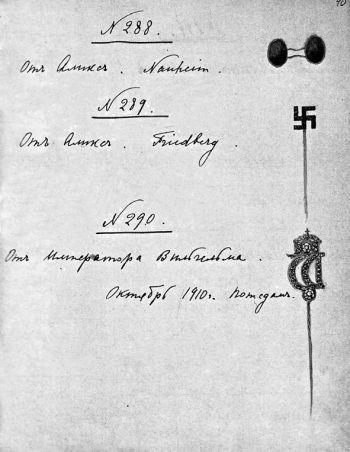
published
Source: www.livejournal.com/magazine/742934.html
The last Russian Emperor Nicholas II (1868-1918) and the Greek Prince Nicholas (1872-1938)
Photo: State archive of the Russian Federation, CA. 1899-1900.
Alexander II (1818-1881) went for the bear with a spear and hated Moscow. Nicholas I (1825-1855) was the only non-Russian Emperor. Alexander III (1881-1894), was not averse to "materkom", but the first of the kings began to refer to subordinates. And Nicholas II (1868-1918), recorded and carefully sketched brand all the jewelry he ever gave. Of all the Emperors did not smoke only Nicholas I. Accordingly, the people working with him didn't, either. And those who worked with those who worked, didn't, either. Didn't smoke and those who worked with those who worked with those who worked. And so on. But because the smokers were treated very poorly all the time of his reign. It was forbidden to smoke even in the streets and squares. The remaining emperors were Smoking. Interestingly, the Empress Catherine and Elizabeth loved snuff. They were both righties, but the tobacco of snuff-taking with the left hand always is tobacco yellowing on the hand skin, and because the left hand yellow and the smell of tobacco, and the right for kissing.
This snuffbox from the erotic collection of Nicholas I:
Incidentally, he is very happy in marriage, as a hobby began to collect erotic collection. This is not surprising. Each of our subsequent the Emperor continued to collect this collection. Both Alexander II and Alexander III, and Nicholas II.
His first bear, a passionate hunter, Alexander II, killed at age 19. And not with a gun, and a spear. He threw his hat on the bear and forth. In the collection of the Gatchina Arsenal remained spears, with whom Alexander went for the bear.
Surprise diary entries about hunting Nicholas II. I have the feeling that he had some kind of complex that is disrupted in the hunt. Here are a few of the records.
19 July 1895: "the duck Hunting was good — just killed 360 pieces".
11 Jan 1904: "the duck Hunting was very successful — total killed 879 pieces."
Buchanan recalled that on one of the hunts Nicholas II was murdered in 1400 pheasants.
In 1900, in Belovezhskaya Pushcha, Nikolai killed 41 bison. As to Belovezhskaya Pushcha, he went hunting every year. Interestingly, the German Emperor Wilhelm II strongly suggests Alexander III to hunt in the Bialowieza forest, but Alexander never took never Wilhelm with him. Alexander had a strong dislike for William.
At pictures of Nicholas II after one of their hunting deer. There is also not so simple. can't shoot does and those who have less than 10 shoots in the horns.

When at the beginning of the First world war in Russia began to Intern Germans who were in the Russian service of the Ministry of the Imperial court, it took all but two of them. One of these two lucky winners were huntsman Nicholas and the Royal huntsman Vladimir R. Diez.
Alexander III has always emphasized his Russianness. To all of "you", he did not disdain and Russian materkom to accelerate their subordinates or to Express your feelings in Russian. In dealing with subordinates he did not have posture — it was very simple, as simple Russian people. Then this beard of his. And the very he loved to be Russian. Although illusions he entertained on this account. His mother, grandmother and great-grandmother was a German Princess. They say that when he read the "Notes" Catherine II and from them learned that the father of his great-grandfather, Paul I, Peter III, and ordinary Russian nobleman, he got excited. Peter the Third was a Holstein-Gottorp Prince, a Russian nobleman still, Russian is heavily increased the share of his, Alexander, Russian blood. Hence the joy.
Alexander I turned to a subordinate, but that was due to the fact that at the court, mostly talking in French, when switched to Russian, then, invariably, passed on "you". Nicholas I told everyone "you". Also with subordinates addressed Alexander II and his brothers. Slave is very afraid, when Alexander Abraxas to their "you" is meant formal tone and the beginning of separation and thunderstorms. The first king who began to talk to subordinates "you" was Alexander III.
— What?? I? Single breasted? What do you mean? Don't know what are single now, nobody is fighting? A disgrace! War at the doorstep, and we are not ready! No, we are not ready for war! ©
New, 1845-yy, the Year Nicholas made his 22-year-old daughter, Grand Duchess Olga Nikolaevna, a Royal gift — she became chief of the 3rd Elisavetgrad hussar regiment. The bomb was so in form, which now had to wear on such occasions Olga. The fact is, like any woman, Olga wanted to be beautiful, and the father wanted to have by the Charter. Olga did not want embroidered embroidery chakirov, didn't want the sword, didn't want pants and wanted a skirt. The conflict was serious. Women are very flexible. They can forgive, forget, sacrifice and, in General, anything, but they can't wear the clothes that they do not like. Olga didn't like the saber — understandable desire 22-year-old girl. The compromise was the exchange: Nikolay agreed to the skirt. Olga was so happy that he agreed to a sword.
Alexander II is rapidly losing its reputation because of this, his second marriage to Catherine Dolgoruky. They were married in a time when it hasn't been forty days since the death of his first wife. And she was no match for him, and stupid, and on calculation on her part, and much more. Family, society, the closest — all of it-began to turn away. Were considered hot in the minds of the most radical options. Why did He marry her??? It turns out he promised her to marry her before the icon.
Two of his younger son, the Grand Dukes Nicholas and Mikhail was sent by his father, Nicholas I in the Crimean war to the front. Because they were sent to the front for the show, and to encourage the soldiers, and then there was a very real — whistling bullets and exploding shells. The guys really fought. Shoulder to shoulder with adult men. Nicholas at that time was 23, Michael 21.
Alexander II hated Moscow. Despite the fact that he was born in it — in the Chudov monastery — he never loved her and couldn't stand. Tried to leave quickly and return less often. I'm trying to present itself on its place in this sense. Not to hate (:-)), and to portability his hometown, the city where I was born is Saint Petersburg. Is not very good and it is not clear how it can be.
Alexander III just after he was born in St. Petersburg. But also said that he hates his hometown — Peter. The happiest time of the year for him was the Passover, when they left to Moscow. Moscow, he was very fond. With pleasure went there and didn't want to go back. He and Peter then lived — he and his family lived in Gatchina. But this is more due to the fact that in St. Petersburg he could easily kill the terrorists, as his father, and in a small Gatchina it was impossible to do, but of Peter he left as soon as walked away from his dying father.

The children of kings in a large number of learned foreign languages. With their relatives, monarchs and princely houses of Europe they were speaking without interpreters. Plus his wife's parents, the mother with the father, which is also preferably in Danish, as Alexander III. But because teaching children foreign languages was very intense. At the request of the Empress Maria Feodorovna in 1856, the Chancellor and Minister of foreign Affairs Gorchakov is preparing a Memorandum on the education of the Grand Dukes. Regarding foreign languages, Gorchakov believed that the Emperor's children is to teach Russian, then French and German languages. Gorchakov stressed that to teach children English, it is not necessary — it still says none in Europe. Now would it! We, the francophils, would be glad :-)
First in Russian, spoke at the court of Nicholas I. Alexander II returned to the French, but even with him his son, the future Alexander III, but while the Grand Duke Alexander Alexandrovich, spoke Russian. Alexander III strongly emphasized his Russianness. He even hated the Grand Duchess Catherine Mikhailovna due to the fact that she spoke very bad Russian, with a horrible accent — the wives of the Great Princes, mostly German Princess, had already in our age to teach the Russian, but because someone has learned it well, and who, as Catherine M., bad. The king is very loved and her children were called "poodle".

This Alexander III. He's on almost all the pictures with a big beard. His father, Alexander II, long before the Turkish war, was forbidden by decree to wear a beard — he did not love them. And no one wore. View portraits of the nobles and officials of that time — none have beards. Moustache, sideburns, but chin naked. But the Russo-Turkish war and during the war the King allows those wishing to go who wants a beard. And all ponatykano. Including the future Alexander III. However, immediately after the war, Alexander II again prohibits the wearing of a beard is to "freshen up," writes Alexander in the Decree. And again, all shaved off. Not shaved just one person — his son Alexander. And then wore a beard always. And when was the Great Prince and then, when they become king. To put it mildly, between father and son was pretty cool relationship. They don't get along with the father and the son.
Nicholas II manic kept quite detailed records. Diaries, albums sometimes are full of such completely unimportant details, that it seems that the author is sick. So I see the famous "Jewelry album" Nicholas II. In it he wrote down absolutely all the jewelry he ever gave. Not only that, he wrote who gave, but he carefully sketched what he gave. 305 records. Crazy. For example, one of the album pages. The jewelry that you are most interested in gave Nicholas Alix:

published
Source: www.livejournal.com/magazine/742934.html





